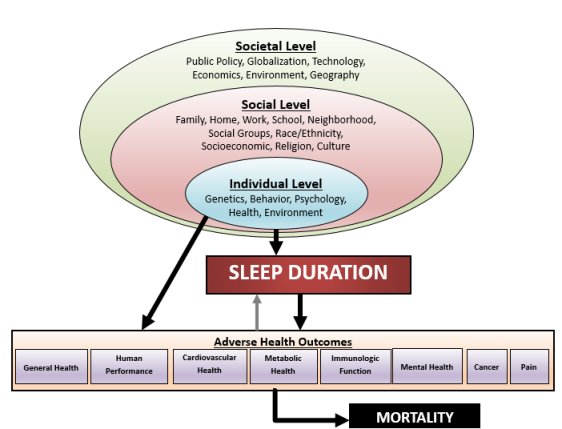 MISSION & APPROACH MISSION & APPROACH
MISSION
The overall goal of the Sleep and Health Research Program is to:
- Conduct research studies on the role of sleep in health in the real world, including
- Clarifying downstream cardiometabolic and neurocognitive effects of habitual sleep duration and
- Understanding upstream social, behavioral, and environmental determinants of sleep in real world settings;
- Develop and implement successful sleep interventions for improving health;
- Improve the understanding of the role of sleep in health disparities;
- Translate basic sleep science findings into relevant, real-world applications;
- Clarify when sleep is a unique contributor to health versus instances where sleep is simply a marker of another process;
- Educate students, health professionals and the general public on the importance of sleep in the context of health; and
- Empower corporations, athletic teams, and other organizations to develop and deploy system-based approaches for addressing sleep and health needs.

APPROACH
To accomplish these goals, we are engaged in the following:
- Observational research studies to better understand the associations between sleep and health and performance.
- Analyses of surveillance measures to document population-level trends in sleep and relationships to health and performance.
- Experimental protocols to determine optimal intervention strategies.
- Clinical trials to assess the efficacy and effectiveness of interventions.
- Program development and evaluation for organizational initiatives.
- Educational programs aimed at students, professionals, and the public.
- Outreach efforts within the community to promote healthy sleep practices.
METHODS
- Sleep
- Prospective diaries
- Wrist actigraphy
- Polysomnography
- Physical Activity
- Diet
- Standardized 24-h recall
- Prospective diaries
- Bionutritional analysis
- Cardiovascular function
and risk
- Ambulatory blood pressure
- Arterial tonometry
- Anthropometry
- Bioassays of inflammation
- Bioassays of lipid profile
- Metabolism
- Glucose tolerance tests
- Bioassays for insulin and glucose
- Bioassays for metabolic hormones
- Stress
- Heart rate variability
- Salivary and plasma cortisol
- Bioassays of catecholamines
- Galvanic skin response
- Neurocognitive function
- Psychomotor vigilance task (PVT-192, Palm, Android, Tablet)
- Neuropsychological testing (paper/pencil and computer-based)
- Psychiatric symptoms
- Clinical interviews
- SCID and MINI assessments
- Environmental measures
- Spectrophotometry
- Photometry
- Sound and noise recordings
- Temperature/Humidity Logging
- Pressure Transduction (for assessing sleeping surface)
|
